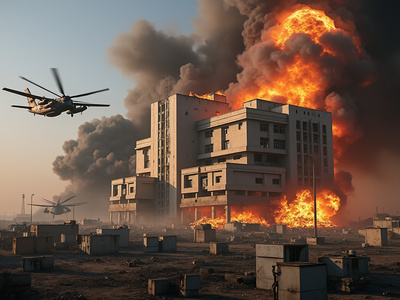Israeli Military Orders Evacuation of Rafah Amid Renewed Hostilities
Rafah braces for potential ground operations as humanitarian conditions worsen.
The Israeli military has ordered a mass evacuation of most residents in Rafah, a city at the southern end of the Gaza Strip, amid indications of an impending military operation.
This announcement was made on March 31, 2025, during the festive period of Eid Al-Fitr, marking the end of Ramadan, which typically involves celebrations among Muslim populations.
The renewed military actions commenced earlier this month after Israel ended a ceasefire with the Hamas militant group.
The Israeli government initiated a blockade by halting the delivery of essential supplies, including food, fuel, and medical aid, affecting approximately 2 million Palestinians in Gaza.
The evacuation orders affect nearly the entire city and its surrounding areas, with the military directing residents to move to Muwasi, an area characterized by temporary tent camps along the coast.
Israel’s operations in Rafah have a complex history, notably a significant ground offensive last year that resulted in widespread destruction and significant civilian displacement.
At that time, Israel seized control of a critical corridor at the Egypt-Gaza border and the Rafah crossing, which represented Gaza's only non-Israeli controlled access point to the outside.
Under a ceasefire agreement in January, which was brokered under U.S. pressure, Israel was supposed to withdraw from the corridor it occupied; however, it has since cited ongoing concerns over arms smuggling as a reason to maintain its presence.
Israeli officials are insisting that military operations will continue until Hamas releases the remaining 59 hostages, believed to include 24 individuals still alive.
Additionally, Israel is demanding that Hamas disarm and vacate the region, conditions which were not included in the previous ceasefire agreement.
Hamas has rejected these demands, insisting on the implementation of the original terms of the ceasefire, which mandated the release of hostages in exchange for a lasting cessation of hostilities and an Israeli withdrawal.
Israeli Prime Minister Benjamin Netanyahu stated that post-conflict, Israel intends to oversee security in Gaza and plans to execute a proposal from U.S. President Donald Trump that advocates for the resettlement of Gaza's population across different nations, which has been met with unanimous rejection from Palestinian representatives who see it as an act of forced displacement.
Human rights experts have indicated that such a plan may violate international law.
The hostilities began on October 7, 2023, when Hamas-led militants launched a major incursion into Israeli territory, resulting in around 1,200 fatalities, predominantly civilians.
Following this, Israeli military retaliation has led to a reported death toll of more than 50,000 Palestinians, according to Gaza’s Health Ministry, although the exact number of civilian casualties remains unverified.
A significant part of the Gaza population has been displaced, with estimates suggesting that up to 90% have fled their homes multiple times throughout the conflict.
The extensive destruction has raised serious concerns about the future of reconstruction in the region.
This announcement was made on March 31, 2025, during the festive period of Eid Al-Fitr, marking the end of Ramadan, which typically involves celebrations among Muslim populations.
The renewed military actions commenced earlier this month after Israel ended a ceasefire with the Hamas militant group.
The Israeli government initiated a blockade by halting the delivery of essential supplies, including food, fuel, and medical aid, affecting approximately 2 million Palestinians in Gaza.
The evacuation orders affect nearly the entire city and its surrounding areas, with the military directing residents to move to Muwasi, an area characterized by temporary tent camps along the coast.
Israel’s operations in Rafah have a complex history, notably a significant ground offensive last year that resulted in widespread destruction and significant civilian displacement.
At that time, Israel seized control of a critical corridor at the Egypt-Gaza border and the Rafah crossing, which represented Gaza's only non-Israeli controlled access point to the outside.
Under a ceasefire agreement in January, which was brokered under U.S. pressure, Israel was supposed to withdraw from the corridor it occupied; however, it has since cited ongoing concerns over arms smuggling as a reason to maintain its presence.
Israeli officials are insisting that military operations will continue until Hamas releases the remaining 59 hostages, believed to include 24 individuals still alive.
Additionally, Israel is demanding that Hamas disarm and vacate the region, conditions which were not included in the previous ceasefire agreement.
Hamas has rejected these demands, insisting on the implementation of the original terms of the ceasefire, which mandated the release of hostages in exchange for a lasting cessation of hostilities and an Israeli withdrawal.
Israeli Prime Minister Benjamin Netanyahu stated that post-conflict, Israel intends to oversee security in Gaza and plans to execute a proposal from U.S. President Donald Trump that advocates for the resettlement of Gaza's population across different nations, which has been met with unanimous rejection from Palestinian representatives who see it as an act of forced displacement.
Human rights experts have indicated that such a plan may violate international law.
The hostilities began on October 7, 2023, when Hamas-led militants launched a major incursion into Israeli territory, resulting in around 1,200 fatalities, predominantly civilians.
Following this, Israeli military retaliation has led to a reported death toll of more than 50,000 Palestinians, according to Gaza’s Health Ministry, although the exact number of civilian casualties remains unverified.
A significant part of the Gaza population has been displaced, with estimates suggesting that up to 90% have fled their homes multiple times throughout the conflict.
The extensive destruction has raised serious concerns about the future of reconstruction in the region.









